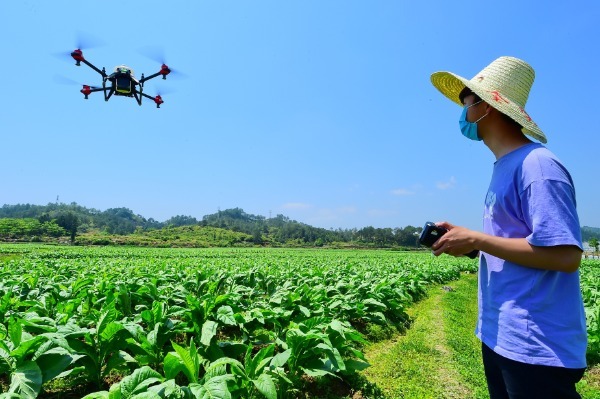Farming drives demand for micro aircraft


In Foshan, Guangdong province, most young workers have left home to realize their dreams in first-tier cities like neighboring Guangzhou and Shenzhen. But Fu Wenlong-an operator of unmanned aerial vehicles, or drones-chose to establish his career in the city's suburbs.
He cofounded a startup, Lingxiao Agricultural Technology Co Ltd, to provide drone services for farmers two years ago, and so far his drones have been protecting some 20,000 mu (1,334 hectares) of farmland in total.
Drone operators are engaged in a new high-tech occupation that is actually much more arduous than many people think.
Taking Fu as an example, he needs to leave at 6 am to drive to the fields, prepare pesticides and guide his drones over large territories.
The scorching sunshine and swarms of mosquitoes do not dissuade him from pursuing his dream. Instead, he enjoys his work, especially when inspecting harvests after his hard work or having a simple lunch in the fields with farmworkers.
He said that as farmers in Foshan have widely accepted drones for crop protection purposes, and with government support to develop a modern agricultural sector, an increasing number of drone operators are desperately needed.
This year, for example, the weather was so fickle that pesticide spraying needed to be finished in less than one week at the peak time for plant pests and disease.
But Fu said that a worker could only cover 5 to 8 mu per day using conventional methods and it is difficult to find enough workers in a short time due to an aging agricultural population in Foshan.
By comparison, one drone can spray 200 mu each day. Moreover, precise spraying with drones can also help farmers use 20 percent less pesticides and fertilizer and increase results by 95 percent, he added.
His team quickly expanded from two in 2018 to 12 drone operators now, serving hundreds of farmers around Foshan, but still lagging far behind the city's fast-growing agricultural development demand, Fu said.
Fu has trained eight drone operators who used to be harvester drivers, but they are still short of at least five operators.
However, the younger generation is still mostly reluctant to devote themselves to the agriculture sector, he said, while lamenting the difficulty in recruiting new employees.
The good news is that drone operators have become a new career choice for the young generation in the suburbs.
By the end of 2019, the number of civilian unmanned aerial vehicle pilot licenses in China stood at 67,218, up over 50 percent from the previous year, said the Civil Aviation Administration of China.
The Ministry of Human Resources and Social Security said about 15 percent of these licenses are granted to the agricultural sector, one of the four main application fields besides photography, measurements and patrol.
The ministry also projects the agricultural industry needs up to an additional 100,000 drones and 400,000 operators this year.



































